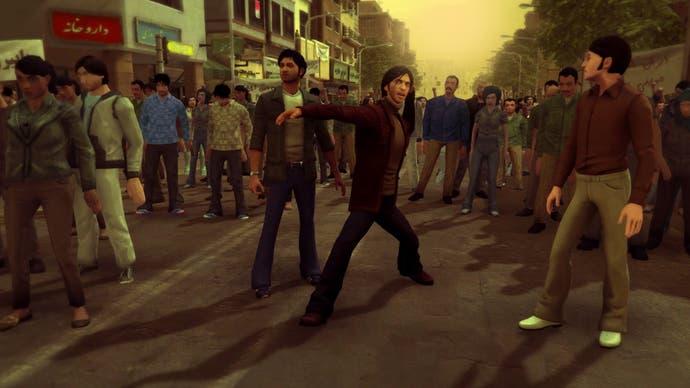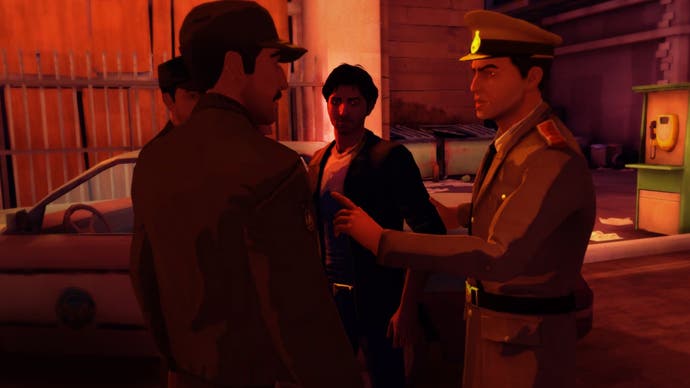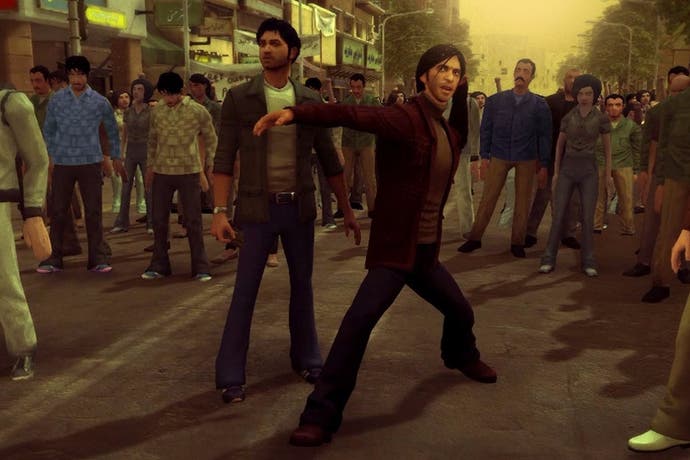1979 Revolution review
The Shah will remember that.
In a post 9/11 world Muslims haven't exactly had the most rounded portrayal in the west - though when it comes to video games they never had much positive representation before 9/11 either. At worst they're sprinkled into shooters as enemy cannon fodder, and at best represented as innocent civilians you're protecting from their homeland's violent extremists. Civilians of these regions are seldom fleshed out beyond panicked extras, so when 1979 Revolution: Black Friday comes along and portrays a good guy who ends his prayers with "Allahu-Akbar", it stands out.
Yet 1979's inside look at the Iranian Revolution is but the tip of the iceberg in terms of what developer Ink Stories is doing here. It wants to use the medium of video games as a vessel to teach people about under-represented cultural histories, while remaining entertaining on a more basic level. Can a video game function as an educational tool without seeming like a pandering piece of "edutainment?" Can the medium's interactivity add anything to a piece of history usually told via film documentaries, photographs and non-fiction prose? Can it hook players who enter the title with limited knowledge of its subject matter? Based on 1979 Revolution, the answer's positive.
Developed by the Iranian born Navid Khonsari - along with several other Iranian developers (some of whom cannot be named for the safety of themselves and their families) - 1979 Revolution's game design doesn't re-invent the wheel as it owes a lot to Telltale's recent adventures. Much of the game is spent choosing between four dialogue options (one is usually to remain silent), examining objects, and engaging in scripted quick-time events. But that's only its skeleton. As Life is Strange and Until Dawn have proven, this format can be pretty elastic.
In some ways, Ink Stories doesn't need to stretch it all that far. As it turns out, many of the choices you make during a hostile cultural revolution are strikingly similar to those you make during a zombie apocalypse or the siege of various kingdoms in Westeros. Who do you side with? Who can you trust? Why can't we all just get along?

For those unfamiliar with the 1979 Iranian cultural revolution, here's the gist: In 1970s Iran there was much civil unrest in regard to its brutish leader the Shah, after US powers put him in charge. Frequently accused of being a corrupt western puppet, the Shah outlawed freedom of speech, promoted torture, and was disliked by many otherwise conflicting groups. These various factions banded together and after a long, bloody uprising, the Shah was overthrown and the Ayatollah Khomeini was put in power. Unfortunately, Khomeini was equally tyrannical.
1979 Revolution follows the turning point in this takeover. Your character, Reza, is a young apolitical photographer. He wants to document the revolution, but not actually get involved. Having recently studied abroad in Germany, his priorities are that of many a young person: he wants to travel, hit the clubs, and hang out with his friends. Becoming a political prisoner would certainly interfere with those ambitions.
But then the s*** hits the fan. Though trying his best to keep his head down, Reza can't help but charge into action when his activist friends are fired upon in a riot. Things get personal quickly and Reza gets swept up in the action of helping his more pro-active friends and family.
That's already a captivating coming-of-age story on its own, but where 1979 Revolution really excels is at fleshing out the moral ambiguity of the situation. Khonsari and company have a more sympathetic view of what a lesser project would simplify as cardboard henchmen or stormtroopers. Ink Stories understands that many Iranian citizens went along with the ruling power out of fear. The supporting cast includes Reza's idealistic, yet violent cousin Ali, his loyal cop brother Hossein and his peaceful pacifist friend Babak, who wants Iran to become an Islamic state. Looming over these factions that flow and weave through friends and family alike are Reza's parents, who seem out of touch yet endured their own cultural revolution in their youth.
Ink Stories wisely manages to avoid the tempting trap of making 1979 Revolution a David vs Goliath story of the oppressed and their oppressors. It doesn't beatify the rebels, nor does it demonise those who joined the ruling party under threat. 1979 will teach you about Iran's history but, more importantly, it's a tight moral drama about good people being corrupted by distrust and greed, twisting idealistic freedom fighters and caring family folk into all manner of beasts.
That 1979 Revolution was made by a primarily Iranian team adds greatly to its authenticity. Like Life is Strange before it, 1979 casts players as a photographer and the camera plays a central role in the game's storytelling. Throughout the game you'll be prompted to snap pictures of various scenes, and doing so unlocks a compendium entry about the subject paired with a real-life photo that matches what you just shot. These images really ground the game's setting in a way its fairly crude in-game graphics never could. It's the developers way of saying that this isn't just some poorly researched sensationalist re-enactment, but as close to an authentic experience as you're going to get in a low budget indie game. There's even options to listen to the game's audio in its native Farsi.
To help acclimate the uneducated player about this underrepresented culture, there's an extensive glossary that explains almost everything you come across. One could argue that too much of the backstory is established through these text entries, but we live in a world where people spend ages scrutinising the item descriptions of Dark Souls' weapons, so it's not unreasonable to assume some players will delight in this optional additional info. It's better than the alternative of having characters awkwardly pile on the exposition through dialogue.
This means when characters do speak, it's usually compelling. The dialogue is fast, sharp, and as natural as one could hope for in a game where you're able to influence the tenure of each discussion. It helps that the voice acting of the main cast is top notch (though the bit parts are noticeably less accomplished).

It's a good thing the audio and dialogue are so sterling as 1979 is otherwise severely lacking in polish. Its visual presentation is competent at best and an eyesore at worst (a supposedly gruesome Trauma Center-like sequence is laughably ugly). Ink Stories does what it can with its low budget and small team, but it can occasionally be hard to get past the rigid character models, flat textures and recycled NPCs. The QTE sequences are likewise poorly constructed while the timer on the dialogue menus is a lot harder to see than it should be.
Ultimately, 1979 Revolution feels like it was made by Telltale's more sophisticated, albeit impoverished younger brother. It doesn't have the charm or polish of a Telltale title (and those are already pretty scrappy to begin with), but it hits all the same narrative beats that have made that studio's recent adventures so compelling. Why make another The Walking Dead or Game of Thrones title when you could cover so much of the same territory in a project just as captivating and enlightening? (That's a rhetorical question. The appeal of zombies and dragons is not lost on me.)
1979 Revolution has some rough spots, but it's a mesmerising proof of concept - that video games can operate as historical fiction/pseudo-documentaries without dumbing down complex, controversial subject matter. I can't wait to see what Ink Stories would be capable of with a bigger budget.





